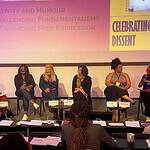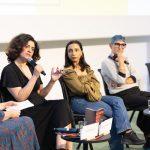Setting boundaries with your Muslim family, as an ExMuslim

Written by Seyyid Hanif (@HanifSeyyid)
Edited by Mitul Mahmud
What are boundaries?
We’ve often heard the word “boundaries” being thrown around nowadays, and while many may theoretically know what that means, but how many of us really understand what it means. What are boundaries?
We can think of boundaries as a line, an imaginary line, that you set around yourself which helps how you interact with others in any relationship, it guides how you would like to be treated, and communicates what you are willing to accept.

Why is it important to set boundaries?
Personal boundaries are vital in order for us to thrive and be in healthy relationships. Having them in place allows us to communicate our needs and desires clearly and succinctly without fear of repercussions. It is also used to set limits so that others don’ take advantage of us or are allowed to hurt us. It is a way for us to practice self-care and self-respect.
With unhealthy boundaries we lose self-respect as we go against our values in order to please others. We keep giving of ourselves and yet feel like when we ask for help we are ignored. Allowing others to determine what we like, where we are going, or who we are shows that we are allowing them to control us which are a signs that we have unhealthy boundaries.
Why personal boundaries are important by Terri Kozlowski
How can we set healthy boundaries?
Choose Your Approach Wisely
When you are angry with your family for violating your boundaries, it may be tempting to lash out at them or limit interactions as a form of revenge. But keeping yourself in a state of anger may not feel good for you. On the other hand, you also don’t want to bend over backwards to be nice to them if that compromises your own emotional expression. Try to find a happy medium, one based on what makes you feel best rather than how it will affect others.
It may feel crucial to assert your dominance after feeling a sense of distress caused by the person whom you feel the need to establish said boundaries with. It is equally important to achieve the goal of setting those boundaries as it is to be true to your character and values. You are not expected to sacrifice your natural self in favor of achieving your goal. A balance must be struck between your personal right of expression and the best way to effectively communicate to the person you need to set boundaries with.
Be Firm, But Kind
Setting boundaries need not mean having to be insensitive. In fact, kindness can actually be more effective when trying to build boundaries with difficult family members. Anger or defensiveness will only rile them up and cause them to lash out.
Albeit, there will be times when argument becomes inevitable. As noble as it may seem to “kill them with kindness” this technique may come across as a weakness to your Muslim parents and work against you. Rather than blindly relying on kindness to communicate the need for boundaries, assess the type of parents/relatives you are dealing with. If they are bold – be bold and assertive. If they are soft – be soft and compassionate. Use vocabulary your parents are familiar with. It’s important to (as much as possible) not tarnish the relationship whilst placing boundaries. Try not to insult their intelligence by using words they won’t understand or trample their “soft tone” with harshness. This may become counterproductive.
Know That “NO” Is Enough
Many of us grew up learning that saying NO isn’t polite or safe, but it’s completely fine to say, “I feel uncomfortable”, “no, this is inappropriate”, “no, I’m leaving,” or “I don’t want to have that conversation”.
One of the strategies your parents may utilize to force their opinion on you is the age old “I’m your parent, I’m wiser, so listen to me”. This is a tactic of manipulation used for guilt-tripping. What they need to realize is that your time and space are important and should be respected. They may quote Quran and/or Hadith to make you feel guilty and that you are wrong for requesting boundaries. You can tell them how important the quality of your relationship is to you, and how having this boundary will ensure that there is no hostility or resentment. Nevertheless, a hard “no, this is not okay” – might be the only thing that would work, and that is okay.

Be clear about your needs and communicate them
Identify your needs and boundaries in advance. For example: How much time do you want to spend with family? With friends? Alone? You may not want to be with family at all during holiday season, and instead, spend time with friends. Guess what? That’s 100% okay. Every human has different limits and every right to set them. Once you’ve identified your limits, communicate them clearly, kindly, and effectively. Be honest and precise. Don’t feel bad for having to tell your parents “don’t say bismillah when I cut the cake”. However, if you choose to not have your parents be a part of your big day, or any day that you’d rather be alone, don’t feel bad about that either.
How can we enforce the boundaries we have set?
Set Consequences
Boundaries will be meaningless if there are no consequences to crossing them. Communicating the consequences beforehand can soften the blow if/when you do reinforce them. So, let them know what will happen if they violate a boundary. Some consequences could include leaving the room or hanging up the phone. If they still persist after this or you need something stronger, you could stop speaking to them for a certain period of time. It’s important to not take drastic measures at the first offense. Remember that the aim here is to be constructive and not destructive to the relationship.
Value yourself and your time.

If the people around you don’t appreciate and respect you, family or otherwise, ask yourself whether you actually want to spend time with them, and how much. You get to choose what you do, with whom, and when. Your time is precious, and if you don’t value how you spend it, nobody else will either. Actively opt to surround yourself with people who build you up instead of tearing you down. Imagine what your life would be like if you exclusively spent time with people who adored and valued you? Ask yourself, if you were to disregard the relationship for a moment, would you miss the company of your parents/relatives? If your answer in a calm state of mind is “no”, then you owe it yourself to pursue other interests without hindrance.
Give yourself permission to do what’s best for you
Cultural norms suggest that you’re supposed to spend holidays with family and that if you don’t, something is “wrong” with you. Ahhh, the joys of stigma! What if yours is a toxic family system, familial relationships are abusive, and your relatives hurt you? At the end of the day, YOU are your biggest advocate and supporter. It’s important to have healthy boundaries, even (especially!) during the holidays, regardless of whether or not others understand and accept them. Limiting time with toxic people is an act of self-love. No shame in this game.
Know your triggers and anticipate them
A “trigger” is a difficult situation or event. We all have them and they’re different for each of us. Triggers can range from your uncle nosing into your marriage, to watching your parents enable and coddle your unemployed brother, to your sister whispering about you to her husband, to your cousin sticking her fingers in the food. Always be one step ahead of your triggers by knowing: a) what they are, b) the emotions that arise, c) how you can best take care of yourself, and d) how you plan to respond. If you suspect that a conversation or boundary-drawing will be required, you can even role-play with a friend in advance to find the most appropriate, least inflammatory language and tone. Being prepared for a stressful situation can make it less stressful.
Make a list of coping strategies
Whether you feel all alone or your complicated family sends you into a murderous rage, the holidays can be challenging. Make a list of coping strategies that will help you get through. These can include: going for a walk, taking a hot bath, listening to soothing music, having a designated friend who doesn’t mind listening to you vent, carving out alone-time, ripping phone books (don’t knock it ’til you’ve tried it), joining an online support group, going to a therapist, lifting weights, journaling, drawing, getting a massage, deep breathing, watching a movie, meditating, bringing a friend along for support, or skipping it altogether.
Be willing to walk away
Something that most people forget is that if someone is being toxic, you do have the option to get up and leave the situation. You might feel like you want to defend yourself, but if your difficult family members are experts at making you look like the bad guy or making you feel bad for blowing up after they have been toxic to you, the best thing to do is simply leave. Just get up and go. You don’t have to explain yourself, you don’t have to apologize.

Seek to take care of yourself
You have possibly been raised to always put your parents’ emotions and needs ahead of yours. But when you take care of yourself, you harbor the willpower to set up and stick to your boundaries. Self-care can help you understand the importance of your own boundaries and can also help to motivate you to make sure your boundaries are defined and that they are being observed. While putting yourself first all the time isn’t healthy, occasionally taking the time to care about yourself first and foremost, especially when dealing with difficult family members is very important.
Practice self-awareness.
Again, boundaries are all about honing in on your feelings and honoring them. If you notice yourself slipping and not sustaining your boundaries, ask yourself: What’s changed? Consider “What I am doing or [what is] the other person doing?” or “What is the situation eliciting that’s making me resentful or stressed?” Then, mull over your options: What am I going to do about the situation? What do I have control over?
Be assertive
Of course, we know that it’s not enough to create boundaries; we actually have to follow through. It’s important to assertively communicate with the other person when they’ve crossed a boundary. In a respectful way, let the other person know what in particular is bothersome to you and that you can work together to address it.
Be assertive yet respectful. They need to know that you are serious about the boundaries and that trespassing over those boundaries is not okay and will have consequences if further breached. Perhaps a friendly reminder at first, then progress up the consequence ladder as discussed earlier.
Start small / Start with Small Goals
Like any new skill, assertively communicating your boundaries is a still that takes practice. It is helpful to start with a small boundary that isn’t threatening to you, and then incrementally increasing to more challenging boundaries. Build upon your success, and [at first] try not to take on something that feels overwhelming. Setting boundaries takes courage, practice and support. And remember that it’s a skill you can master.







